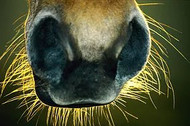WHISKERS – DOES YOUR HORSE REALLY NEED THEM?
Oct 31st 2013
Do you clip your horse’s whiskers? Many people who compete their horses do, but why? They look untidy and spoil an otherwise immaculate turn out. At least that is the usual answer. Some showing classes even demand that all superfluous whiskers are removed. But are they really just an optional extra?
As far as the horse is concerned their whiskers are an extremely important sensory tool. A horse’s eyes are positioned in such a way that they are unable to see what’s immediately in front of them or on the ground below their nose. Whiskers on the muzzle therefore are effectively an extra pair of eyes, helping the horse to work out what he is grazing on or where the walls are in a dark stable. Horses also have long whiskers near their eyes and these are also there to help them avoid bumping into things that cannot ordinarily see.
Many horses object quite strongly to having their whiskers removed. As the horse uses his whiskers as a kind of third eye, could his objection be because he’s actually a bit short-sighted and losing his whiskers would be like you losing your reading specs? Whilst we’re able to diagnose problems like disease, infection and foreign bodies affecting the horse’s eye, we can’t actually tell if a horse has a visual impairment outside of these areas.
The horse’s whiskers are a vital part of his complicated peripheral sensory system which supplies the horse’s brain with input from a vast array of sensory receptor nerve cells scattered throughout his body, particularly in the skin. The skin varies in thickness ranging from 1mm to 6mm and is at its thickest where the tail and mane grow. It also varies from horse to horse depending upon breed, sex and age. The density of sensory receptors in the skin differs too; some areas having hundreds and some thousands. Tactile sensitivity is especially acute around the face; nose, lips and eyes. These areas contain the highest density of receptors and a concentration of long, stiff hairs – whiskers. The follicles from which the whiskers grow are surrounded by nerve endings. Each time the horse’s whiskers come into contact with an object, the nerves fire off a 250mph electrical message to the brain enabling it to determine what the horse is touching.
So, from your horse’s point of view, shaving off his whiskers just to make him look nice and tidy is pretty much akin to making you wear thick gloves and then asking you to identify objects blindfold without your sense of touch or tying your hands behind your back and expecting you to find your way around a room without bumping into anything. Leave them on; your horse will thank you for it!

